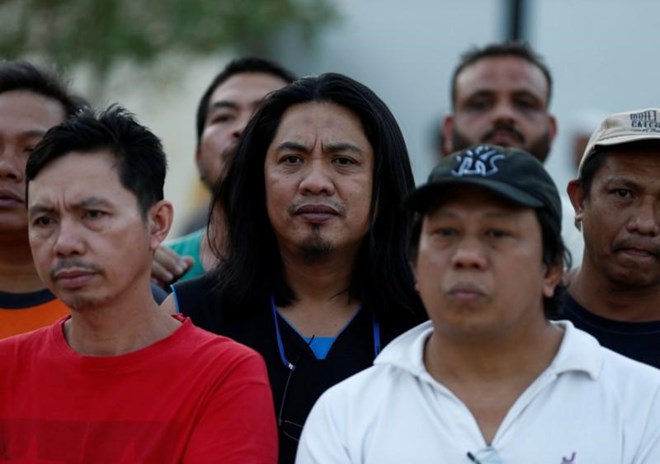
Tuesday August 8, 2017
by Katie Paul

An expatriate worker walks at his accommodation in Riyadh, Saudi Arabia August 1, 2017. Faisal Al Nasser/ REUTERS
RIYADH (Reuters) - For four months, texts from the government pinged into every mobile phone in Saudi Arabia ordering "illegal expatriates" to leave the kingdom before the end of an amnesty that expired in late July.
The campaign, "a nation without violators," warned of fines, jail time and deportation for anyone caught without valid identity documents after the grace period, in a renewed push to reduce the kingdom's abundant black market in labor.
Saudi authorities estimate more than 600,000 people took the amnesty, which allowed any foreigner in breach of residency laws in the world's top oil exporter to leave without penalty.
But millions of others have remained, either determined to stay or unable to avail themselves of the offer. Now they are awaiting a pledged crackdown against what Riyadh calls the "reckless people" who defied the order to leave.
"We don't know what will happen to us," said Atif Alam, 28, an Indian worker at a desolate labor camp in eastern Riyadh who fears a police raid. He rarely leaves the camp, wary of being seized at police checkpoints on roads throughout Riyadh.
Aurangzeb Akram, 43, a Pakistani worker at the camp, rejects the idea that he is "illegal" or "reckless".
"I am legal. I came here (for the) Binladin company," he said, holding up an expired "iqama," or employer-sponsored residency card.
LABOR BLACK MARKET
Some 12 million of the 32 million people living in Saudi Arabia are foreigners, according to official figures, most of them low-skilled workers from Asia and Africa working in the construction and service sectors.
But several million others live here outside the law, running unregistered businesses or accepting informal work with companies skirting requirements to hire Saudis on higher pay.
Authorities have not released population estimates for "violators", but before the start of the amnesty, a member of the advisory Shura Council called for the deportation of five million people, according to al-Hayat newspaper.
Some entered the country illegally, risking a dangerous journey through Somalia and Yemen, while others overstayed work visas, ran into labor disputes with their employers or came to perform the annual Muslim haj pilgrimage and never went home.
Saudi authorities tolerated labor irregularities for decades, due to the expense and economic impact of expulsions.
But with greater pressure in the past decade to create jobs for Saudis, for whom the unemployment rate is 12.7 percent, the government has committed to clearing out the excess workforce.
Akram quit his job last October, after a slowdown in construction prompted the Saudi Binladin Group to stop paying its sub-contractors and tens of thousands of foreign employees.
But he said the company never processed his payments or his visa papers, and retained his passport, leaving him and the other 300 men at his camp without valid identity documents. The company did not immediately respond to requests for comment.
The kingdom offered a first grace period back in 2013, after introducing a quota system for hiring Saudis in the private sector. At least 800,000 people were deported in the crackdown that followed, according to figures compiled from local media.
In some cases that campaign turned violent, with unrest in urban areas and detention centers. Pressure for economic reform has only grown after the oil price halved since 2014.
Expatriate workers gather at their accommodation in Riyadh, Saudi Arabia.

Expatriate workers gather at their accommodation in Riyadh, Saudi Arabia. Faisal Al Nasser/ REUTERS
SLIPPING THROUGH CRACKS
Authorities appear to have run a more organized amnesty this time, although they did not respond to Reuters requests for comment on the planned clampdown. Workers in Riyadh report individual arrests, but no mass raids or expulsions so far.
Still, thousands of workers slipped through the amnesty's cracks. They were refused exits, many of them apparent victims of slow-moving bureaucracy, complex legal problems, or both.
Wilma, 43, a Filipina beautician who gave only her first name, applied for the amnesty and was rejected because of an unresolved wage dispute case against her former employer.
She won the case two years ago, but never received her passport or missing six months of wages. In the interim, her residency expired.
She found a job off the books in another salon last year, which helped pay for the bed she rents in an apartment with other workers from the Philippines in central Riyadh.
But she quit as the grace period ended, wary of being caught working without valid identity documents.
"The premise of this amnesty is that the irregular status of the worker is his or her own fault," said Vani Saraswathi of Migrant Rights, a Gulf-based advocacy organization. "In reality most workers have no power over their visa status."
"There is likely to be a crackdown, but for most workers it's a risk worth taking."